It was a very quick week of work in Padibe – Shawn was busy at the Sunflower Press while I hit the pavement to begin working toward our education goals. The Press is progressing better than we ever could have expected, the ebb of so many customers coming and going is proof. The first batch of seed is running out and we are now preparing for the fall season when the harvest will be abundant. Based on the many fields of sunflowers we have passed along the road, we are expecting a crop that will fill the press to capacity — hard to believe, but it’s true. This project has been so popular that when news that our current supply was low spread, the people were coming in a non-stop wave – this time with the biggest jerry can of oil possible as opposed to the little kids coming by for a cup of oil (which we saw last week). After all if the preparation and fundraising, it is awe-inspiring to witness its success. The guys are even heading to Kampala to purchase industrial-sized steel racks and a silo because we are expecting the fall rush to be just that overwhelming!
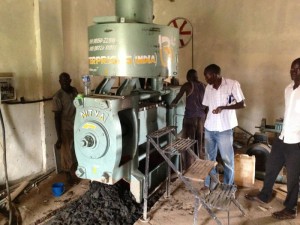
Last week Monday, I met with the education committee — Otim John Bosco, our head, and three other guys, Patrick, Morris, and Richard, who are his former students and now successful teachers. They have been very pleased with our sponsorships project so far — they explained in detail how they conducted extensive interviews to pick the students we are sponsoring. The committee is sending them to the best school that is still somewhat close – about a 45 minute drive away – in Kalongo, and I plan to meet with most of them there next week while staying with the sisters. I was a little concerned that the students would be disappointed to be stripped away from their parents, as community is such an important part of growing up here, and the committee assured me that all of them were thrilled by the idea of a good education in a boarding school sponsored by the Americans. In fact, many students were begging to go. It seems that the kids here, especially the extremely bright ones that we have chosen, understand that doing something great for the community requires a great education and if that means that they need to get out then, so be it. It does dishearten me though that there is no school in Padibe that the Global Solidarity believes could offer these kids a form of solid education, which leads me to believe that we need to think bigger than these 13 students. We can’t send all of Padibe’s best and brightest away for schooling… there has to be a better answer for those who value education and live in Padibe. So, that being said, we are starting to brainstorm as to what the bigger projects look like around education. So far, we have come up with the idea of a printing press that could help school costs by printing the class materials and examinations (apparently, the closest one is in Kampala, a full day’s drive away). The next idea, which I am the most interested in, is the creation of a model school here in Padibe that would run similarly to the ones we have seen from the Catholics and Jesuits in Gulu and Pader. Rehabilitating the existing schools is nearly impossible – with 180 students per class, teachers who only show up certain days of the week, barely enough materials, inherently low standards, where would we start? I know it is a huge dream, but before I leave I hope to visit the school started by Monsignor Odong in Pader that runs under this model: high standards and a rigorous education that empowers the students of the north to rebuild the community on their own. For me, that is why education is the answer here — the people know their culture and what works and what doesn’t more than I ever could, so the idea is to empower them to do the building, empower them to have the ideas, empower them to be the doctors, the engineers, the teachers of the future Padibe who will lift the community back up to a respectable standard of living. The third idea was to build a nursery school onto the current primary school, but we are skeptical to just throw more money into a current system that is not working. Just as my fearless headmaster at Pewaukee says all the time, we have to rethink the system to make real change. The final idea was to begin teacher sponsorships where we could send teachers back to school to continue their education (similar to a Master’s Degree) but this one is also less appealing to us because it is very expensive and if we educate 2-3 teachers in the community, we would be spending a large amount of money but not really reaching a large part of the student population. Additionally, there is no guarantee that the educated teacher would stay in the district or could be able to work through the terribly difficult challenges of a system that is not valued in a way that could really bring change. Anyway, the meeting was a success and it was really inspiring to hear of all the processes that went on over here to make our dream of student sponsorships and relationships a reality. The interviews, the discussions with the parents which required that the committee convince them of the importance of their child’s education, the full days of picking the kids up from all different parts of this wide community, and bringing them to the school all humbled me. My favorite news was that the students, when chosen, have grown immensely in their self confidence and efficacy – I cannot wait to meet them and hear their stories, share in their joy and bring all of the love and letters from home to their lives. But this definitely has me thinking: what if we could do this for so many more students?
On Tuesday, I went to the secondary school, Padibe Girls’ School (even though there are boys there… I know; I still don’t get it) as they have collected and gathered the students from the school to become pen pals with my students at Pewaukee High School. A few months back Morris went there to get the names of interested students and came back with a list of 40. Well, when he showed up Tuesday with the white lady, it changed things entirely: suddenly, it wasn’t just talk but rather a real person with a real plan. That being said, 70 – almost double the initial amount! – showed up to have their pictures and names taken! We initially allotted 30 minutes to get this done and the whole thing took about an hour and a half! Of course, the students were just late to class and blamed it on the Muzungu – oops! I will be leaving with letters from the students here for my Pewaukee High School students, but, dang, I’m going to have to get working to publicize and grow our group — so, if any of you Pewaukee Global Solidarity students are reading this, it’s time to hit the pavement and grow our numbers! 🙂 Wednesday was spent visiting more schools and meeting with more headmasters. I really enjoyed the nursery school kids (aging from 2-6); they are so friendly and lack any wall that sometimes remains a barrier for me and their older counterparts. They very proudly sang songs that showed they could name (most) of their body parts in English as well as their numbers (9, 10, a BEEEG FAAHT HEN! So freaking adorable: and, yes, I have video footage :)). I did feel sort of annoyed by the meetings with the head teachers who had nothing but a list of things that were wrong with their schools to hand to me. We are not going to be able to fix everything, especially by just writing checks which seems like the agenda of so many people. As we have seen with the issues of welfare recipients in the US, there is something really disempowering – harmful, even – about just giving handouts and walking away. As one of our friends Charles put it, they will only be back again asking for more, more, more instead of going out to fish for themselves. So while I understand the pain and struggle, it is easier to walk away from these meetings maintaining boundaries if I keep this in mind: handouts only harm in the long run.
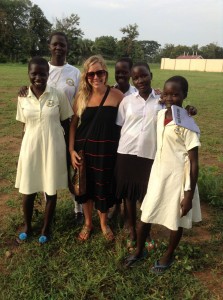
At about 1:00, I was pulled away from the school and taken with the Sunflower Press guys to the house of our machine operator, Michael Onakeliet. He was the main guy behind the water filtration project and one of the hardest workers we have met. Quiet, a little shy, sincere, he always repeats himself in a way we’ve grown to love to ensure that we understand him. The big news (or the “order of the day” as they say here in Uganda) was his new baby boy! He arrived only eight days prior to our visit and we were having lunch there to greet him and his wife. We’re still not really sure how his wife, Beatrice, managed to prepare a full Ugandan celebratory lunch while taking care of an 8-day old, but I have a feeling that the mother, mother in law, and mat-full of familial women sitting with her had something to do with it. Ah, these people, I tell you! They know how to support each other. So, humbly, we entered his house (yes, a real “house” that he had built; we are so encouraged to see that the people who are really working hard like Michael are enjoying the fruits of their labor! They are an inspiration to us and the other villagers) and were served lunch. After we were through, Beatrice came in with the baby – ohhh my goodness what a sweet angel (admittedly, meeting him made me sentimental as I keep thinking of my sister who is about to welcome a little man soon – I have been telepathically begging him to hold off two more weeks!). When I asked his name they all gave me a funny look, so I had a feeling something was up. And sure enough, all of the elders, and women, and relatives crowded in as we found out that that’s why they had brought us there: to name the baby! What?!? Apparently children are named based on events that have been important to the village and our visit was too important to miss in the history of Padibe. 😉 So, because most people can’t pronounce the name Shawn, we named the little guy Alexander (Alex, which is a name we like but will never be able to use because we don’t hate our future children). It was pretty humbling. After some celebratory sodas and pictures, we were back on the move to Padibe to have Shawn’s final supper with the sisters and priests.
On Friday, Shawn’s last day in Padibe, we attended the early morning mass where we met Christine, Tommy’s wife. She asked that we stop by their place on our way out to Gulu (the city where we were spending the weekend). I guess I didn’t know what to expect, but I can assure you that most of the time that we are asked to go to someone’s house it is usually to hear a proposal or a request. So, as we entered the place, Christine was doing wash which she quickly put away and went to get Tommy. As we sat there, Tommy began by telling us that in the Acholi culture the people don’t come together simply in the good times, the peaceful and celebratory ones, but also to mourn. They wanted to sit with us for awhile to share their deep sorrow for our miscarriage prior to our arrival in Padibe. Christine then chimed in and from a very real place explained the sorrow of a similar tragedy in their home: she too experienced one after their first born, Claudia, and was home alone when it happened in the middle of the night. I can’t really tell you why, but I was so touched by their sorrow, their sharing of pain, that my eyes started leaking (that’s how I cry here: the moments of intense emotion come quickly and instinctively, not so much arising from my belly but rather rawly pouring out of any and all the available crevices). It really felt like we were equal in our pain and in our joy, and it was the first time that I felt the empathy of someone here, that I was an equal human who also knows pain, who doesn’t always have the answers. I tried to talk but couldn’t do it well because of the aggressive lump in my throat, but I attempted to explain how these moments of sorrow and struggle that we share are really the glue that is tying our relationship together more strongly, which is I guess why I’m writing about such a personal matter in such a public place. I felt this same truth in the U.S. as well. While the event of our loss was tragic, it was one that was able to bind me in a new way to all of the people I love including my husband, family, friends, even acquaintances who wanted to share their stories of similar pain and loss with me. The cultural expectation of silence around the issue of miscarriage disappointed me about Americans – why can’t we mourn together? Why should our pain be so secret, so shameful? In this moment, I felt so grateful that Tommy’s family, living in the bush of Northern Uganda, has somehow come into my life, connected to the truth of why humans were meant to suffer together, teaching me to understand some piece of humanity that has been forgotten by my culture – one that knows isolation more closely than community. If you would have told me that this would be the case as a little girl, that some of my closest friends would be from halfway across the world, I wouldn’t have believed you. But every time I arrive here and spend time with these people it seems so obvious that this has been part of God’s plan for me since the beginning.
Today we went to Lukung to video tape and record the music of the thumb piano band. We first met the elders under a tree at the school (a common meeting place as they are all former teachers). We thought we were simply meeting the band and then having lunch but as soon as we got there I was introduced to the headmaster and told that one of our sister school students (7th grade sponsored David Ocan) was in attendance there, and I would be meeting him before we moved on. WHAT?!? I was so excited to know that he was close by. Before we went in to talk with him in the Headmaster’s office, the group gave me some background information about the school. Â The teachers all lived there on the school compound because of the understanding that this is a lifetime commitment. Ha – which all of us teachers know too well. Â They explained that there were 1,015 students in the school with only 15 teachers but the good news was that enrollment was going up. Slowly by slowly they are trying to change the local people’s perception of the importance of education and with the gradual growth of the economy, it seems to be working. Anyway, the government will only pay for 13 teachers so the school had to raise funds on their own to hire more teachers. Another laughable political struggle was that the government claims they don’t need to pay the teachers in the north as much because they have plenty of land and can farm for more income but as the headmaster said, “Now, WHEN do they have time to dig?” For that we have no answer. Similar to Pewaukee there are remedial programs after school to help struggling students as well as cultural dance troops and football (or soccer) practice. So the struggles are many but as I walked the school grounds and witnessed the confidence of the students who attend here verses the ones sitting around in the fields, I see why it matters.
After some time, the boy sponsored by the 7th graders at Asa Clark Middle School, Ocan David, was summoned from his class and led to the principal’s office where we would meet. Oh boy, did he look afraid upon entering! Not only to be called to the office but to have to talk to the Muzungu had to be intimidating! The headmaster kept telling him he could be free with me, and I tried to make a joke or two in broken English, but it didn’t help. So I grabbed the trusty iPad and played the video created by the Pewaukee students that we prepared for them. Since it began, he was memorized. As I showed him all the pictures of American students and explained their grade levels, he couldn’t help but crack a soft smile.  I continued to explain the situation, the kids, the support, the funds, and tears began forming in his eyes. We took out his grades and the headmaster proudly showed me that he had earned the equivalent of all A’s except for English, which I told him he could work on via letter writing to his American friends. 🙂 Sure enough, he began to open up, telling me that science was his favorite subject and that he wanted to be a doctor. That his father had died and he only had his mother and six siblings, three boys and three girls. He, the youngest of all, the first to attend school. Quite appropriately I found out that David’s surname means  “One who has been born into much difficulty.” Later when he left, the headmaster explained that he had to travel 6 kilometers to school and in the rain it is difficult. So, already I’m thinking, how much would it cost to get this kid a bike and a raincoat? Not more that $20 we are told.  What will be neat is building these relationships with our students back at home and letting them take it in any direction they see fit. There is a lot we can do.
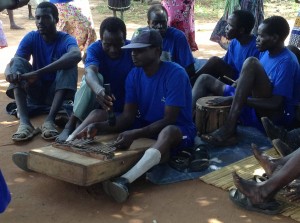 We then took some recordings of the thumb piano band (you have to see this to believe it (above): a whole band made out of instruments that come from literally nothing). The name of the band is Can Oniang, meaning Deep Poverty. Their songs were formed in the traditional cultural fashion, each speaking of a message that addressed some cultural issue, the names ranging from Stop Domestic Violence to Where Have You Been Last Night (to stop infidelity, of course :)). It was a whole form of education to listen to Louis interpret the titles and lyrics of the songs and their meanings as I took notes. Â Shawn set up a full recording system and before long the women, the children, the clansmen and a small crowd had gathered to watch the show. As I videotaped from my iPad, the kids watched in fascination behind me. Louis, the retired teacher who is the manger of the Sunflower Press and essential in our work, explained to them that if they work hard in school maybe one day they too can travel like me. As with the groups of kids in my memory, there are all kinds: the half-naked, mud-crusted ones with flies all over their runny-nosed faces, their heads cracked with sores and scabs; the well adjusted, fairly dressed ones who are not afraid to approach me and shake my hand; the flirtatiously smiley ones who run and hide when I wave at them. There are so many but watching them in the community made me realize that they are not void of love and attention. All of the elders both scolded and supported them during our afternoon together, and they listened. “Be quiet while we are recording;” “give the Americans some space while we are recording;” “hush the crying baby while the Americans are recording.” And they all just listen. It’s pretty amazing. No one is left out here. Â We were quite pleased with the recording and are looking forward to getting some of the music on CDs to sell as a fundraiser. After our first session, Charles and his wife Alice had us for lunch with another highly esteemed couple, Christine and Vinancio. The meal was a feast – who knew steamed pumpkin leaves cooked in Tahini could be so good?!? – and I enjoyed talking to the women about their cooking methods. Before I depart I will cook like a Ugandan! They have promised me!
Saturday morning we were able to sleep in again despite our intent to  get to early mass with Father – whoops! All of the food had been purchased, the animals slaughtered, the beer and wine… ready.  Not cooled, of course.  We are learning to like warm beer as a necessary part of survival here in Padibe.  🙂 Tommy arrived early with Otim John Bosco, the head of the education committee and master of ceremonies for the wedding. I was able to meet him for the first time this morning and he seems like the one we want to work with.  He is poised, dressed very smartly (which is more valued than we can understand in this culture), and very articulate. Also very joyful! As the men set up, we were told to stay inside and get ready while everyone set up the chairs, the tables, the food, the microphone system… and, in true African style, the wedding was supposed to start at 12:30, but we found ourselves sitting in the kitchen waiting to hear that we were on standby until… yes… 2:00 p.m. My preparation for this wedding ceremony was quite a bit different from the last.  Most importantly, Shawn helped me to get ready, to perfectly position the flower pedals in my hair, to calm down my nerves, to offer me the Ugandan version of an early morning hair salon mimosa (yep, warm beer) while we waited.  At about 12:30, Sr. Judith arrived with a real wedding cake – three layers, baked in an oven.  She said she had been up until 1:00 in the morning making it!  Man, am I grateful for her.  Just before heading out, we asked her to do the “smart check” – are we dressed smartly or stupidly – and she pointed out that I needed a petticoat (these people are so British, but in all honestly, you could kind of see through my white maxi dress, so you can’t really blame the culture for that one :)).  She hurriedly ran to town to see if she could get me a slip, while Shawn and I attacked (literally) an old t-shirt, tearing it apart and pinning it back together to form a jerry-rigged slip for me.  I am so grateful that Judith has come to the rescue as my friend.  Yesterday she took time to explain the clan fights in more depth and today she was on the look-out for the judgement check.  It seems that after coming to the US she has a better understanding of what it’s like to be the outsider and a certain sympathy for me.  I am grateful to have a woman who can be my shield in this way.
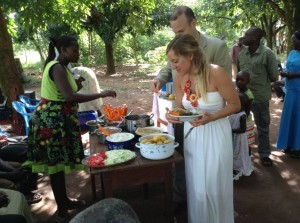
Finally, at 2:00 in the afternoon, Deacon Alfred (the one who is staying with Fr. Romano now) came to alert us that we were on stand-by!  And just like that, the people came to get us from the church, dancing and singing in typical Ugandan style.  Father Romano led us down the aisle of colorfully dressed men and women, dancing the whole way through.  We have the video footage, but I am skeptical to post it so publicly, as we are clearly WHITE and clumsy while these people have had rhythm pumped into their blood since the womb.  We arrived to the celebration grounds where Otim presented us, the wedding party, the church members, the what… This was followed by the introduction of everyone who attended, followed by the introduction of the introduction (again, the formalities of the colonial system are quite laborious).  Anyway, after much pomp, the celebration continued with some speeches from Tommy, Shawn, and myself (where we reiterated that this marriage would not be possible without the people of Padibe and this sister parish relationship).  We then cut the cake, the tradition asking that all of our close friends hold onto us as we took the knife and sliced through each layer of the cake as we recited “In the name of the Father (slice), the Son (slice), and the Holy Spirit (extra big slice).  The women then cut the cake and shared small slices with everyone in the attendance.  We, of course, had to feed each other cake and Shawn took the opportunity to nail me in the face with a triple sized bite.  We got a big laugh for that — it seems that the people here like when we are human, also shown by the huge echo of laughter when Shawn tried to booty dance up on me, passionately lip-synching to the Ugandan hip-hop music later on in the evening.  🙂
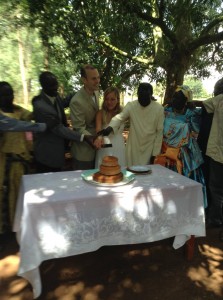
Soon after, our friends Bob Okello and his wife, Nighty, and daughters, Michelle and Aber, showed up from Gulu. Â These people were some of the first Shawn met when he came to the Archdiocese and have continued to remain friends with us since. Â I remembered meeting his daughters in 2011, quite possibly the most affectionate, bright and well-versed English speaking children I have met and after a little encouragement, they came over and sat in my lap, dancing and laughing with me. Â Aber (the oldest) played with my hair while Michelle – the 2 year old! – jokingly kept attempting to sneak a drink of my wine. Â Later, the entertainment arrived — a group of local women who maintain the cultural dances — and danced a few of their wedding dances while we watched. Â They encouraged me to join and after awhile I think I got the hang of it. Â It took a few glasses of wine and a lot of laughing at myself before mastery. Later on, we brought out the cases of beer for everyone to have, and we laughed at the awkward hesitation not really found at an American wedding. Everyone just kind of stared at the cases and when offered said, “no, no I shouldn’t.” Not Shawn though! 🙂 Â Later Fr. Romano would explain that people are hesitant to drink in front of the parish priests. Â But in typical Fr. Romano style, he cracked one open, tied up his priestly robe around his waist and started dancing with a homeless wedding crasher – that got the party started! The dancing ensued and the women taught me some of the traditional dance steps, and we enjoyed. As the night went on, the traditional music ceased and hip hop and reggae music took over as things started to get wilder. Some of the youth started talking to me more freely, laughing as you would imagine some college freshmen meeting for the first time in the international dorm. Â And, for the first time, if only for awhile at least, I felt like one of them.
Last week, Shawn and I took our first ever (almost real) backpacking trip in the Rwenzori mountains in southwest Uganda.  I say almost because the whole operation (owned by an Australian) runs under the colonial system: you pay to have two tour guides (one for each of you) and four other west Africans carry all of your stuff, plan your route, cook your food, etc.).  The whole concept is humbling and sickening at once, but you have to get used to it because if you want to go up, that’s how they do it here.  Regardless of the inherent system, it was HARD, man!  Hot, steep, relentless.  Our first trek on the trail was straight up the mountain for about 6 hours.  This type of journey really did test my wherewithal and asked that I face my demons.  I will admit that there were a few times where I mentally cursed the bloody idea of walking up a mountain-side in pea soup humidity as a second honeymoon, even cursing the one who came up with the idea (I’ll give you a hint… it wasn’t me… ;)).  But man, as we finally arrived to our first view from high up in the midst of the heather trees (yes, the ones you normally associate with Africa), I was overcome with emotion.  This place was so beautiful and raw.  Monkeys jumped from branch to branch of the high trees, while huge globes of moss hung from the branches, as if out of a Dr. Seuss book, butterflies of all colors and designs followed us upward… and every struggle was so worth the end result.  The next three days on the trail all sort of blurred together but every time I wanted to give up, we’d encounter some new terrain with a new kind of vegetation  that one only can imagine seeing on National Geographic channel. And then, of course, I would cry in overwhelm again and the fatigue would fade. Somewhere along the way I started to realize that how I approached each day on the trail was entirely up to me.  I could focus on my spaghetti legs, or I could focus on the cascading waterfalls.  I could focus on the rain, or I could focus on the new life that popped up around me because of it.  So, while this journey was trying it seemed that God was preparing me for our time in here in Padibe.  It could not have been any other way.
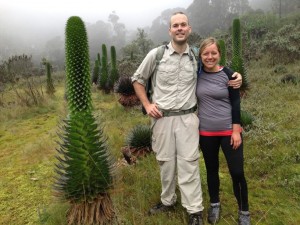
As I alluded to, it has been a hairy first few days in Padibe.  When we woke up at 11:00 on Friday, went over to see the Sunflower Press – yes, it’s real! And very impressive – and began to discuss the wedding plans.  We wanted to make sure that all the people we are friends with were invited and as we mentioned the name of the headmaster of the secondary school, Tommy told us that he was in jail for no good reason.  We asked for details and Tommy told us that one of the rich men in town (from another clan) is after his clan’s land.  Because this man is wealthy, he paid the policemen to arrest the head men in the clan. We are very concerned for the safety of our friends but they will be getting a lawyer and Tommy seems to think that this will all be settled through him.  We are obviously upset about it.  For Shawn and I, it had been difficult to process all of this especially immediately upon arrival.  We are told the land wars and clan struggles are simply a part of the aftermath of war, but the corruption is hard for us to understand.  The situation has caused me to wake up a bit and simply remain present in what’s happening now.  It seems that I was operating under some assumptions that everyone loves me here, that they have been waiting for me to come back, etc.  And, truly, I think that the first few days here have been about ripping away the stories and bringing me back to reality.  This is not about the “story” of going to Uganda, but rather it’s about being here now and experiencing things as they are.
Being here for a second time is similar to reading a book twice. Â I know the characters and the plot line is familiar. Â The women with jerry cans and logs on their heads are not so shocking to me anymore. Â The lifestyle of living in a hut is not quite as romantic as it may have seemed to me the first time around. Â Rather, the surface is peeling back and I am more able to see the humanness behind the culture shock, the real people behind the stories. Â I put myself in this life and can see the relentless difficulty… what it means to dig in the field every day, to count on Mother Nature to bring the right crop conditions. Â While there is something pure about this lifestyle, I also see that there’s something really unfair about it. Â How is it that we are born into a society that doesn’t have to face these struggles just to survive? Â And survival is not guaranteed after all of that either. Â It’s been really difficult to hear about the land wars between clans, the corruption of the police, the cruelty and retaliation that the people are dealing with — the lies, the back-stabbing. Â But, just as I realized when hiking in the mountains, we aren’t meant to walk on some man-made bridge up to the top. Â There is struggle in the climb because thats simply how it works. Â I was thinking that yesterday as Shawn and I were struggling to make sense of the fights: God has given each of us a strenuous path to climb, as we climb up toward the truth; these are the burdens of the Padibe people and because we are connected to them, they are now ours too. We are not guaranteed an easy go of it here, and it was silly of me to think that my month in Africa was going to be one of carefree relaxation. Â But that is why we don’t just show up here and expect things to be easy – that’s not why we signed up for this. Â It would be a lot easier to just show up and drop off the Sunflower Press machinery and say “good luck”, to send the school fees and let some anonymous kids go to school. Â So while the first few days have been challenging, I am making peace with our trek. Â Because I have realized that the view from the top is somehow more beautiful when you struggled to get there; when you walk the steep slopes and understand the mountain from walking her footpath. Â Instead of resisting the struggle, I am preparing myself to embrace it. Â Instead of asking, why me, why this, I will say okay, it’s me – I have been the one chosen for this. Â How can I help? How can I be the conduit for good?
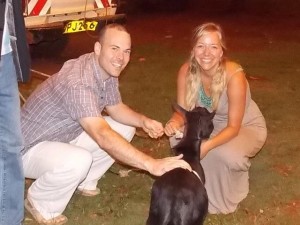
We are heading into our wedding ceremony here which has already been a reminder that for every difficulty, there is so much that the people here have and want to give: the donated goat has already been slaughtered (talk about appreciating the sacrifice of food — yesterday we just were petting the little guy and already this morning heard him make his last bleat). This is a mutual journey we are embarking on here, and it’s the relationship, the holding of hands as we struggle upward together, that makes this place, this connection worthy of our time.
Hi everyone – Erin Alexander here! Yes, that’s right, I am officially wedded to Shawn D. Alexander, project manager, as well as my work in that little village tucked away in the tip of Uganda. But it’s no surprise. I haven’t been able to get the people of Padibe off of my mind since I met them two years ago. The vantage point from which I enter this trip looks a lot different compared to my first go of it: Shawn and I are married, we live in a beautiful home where we (attempt) to grow crops like the Ugandans :), and we now have an education project and a sunflower press up and running! There are too many small miracles that have led to all of these developments to mention but the most notable one is the phenomenal willingness of my school district, Pewaukee Schools, to get involved with this relationship. After meeting Tommy Oyet and Fr. Romano Ouma (Padibe parishioners that traveled to Pewaukee a year and a half ago), my principal, associate principal and superintendent were eager to get involved. I know, right!? It takes a special work place to willingly commit the fundraising efforts of the entire school district to this type of work. Anyway, we brainstormed all sorts of ideas but the best we came up with was a sister school connection: each grade at Pewaukee School District would fund-raise and sponsor 13 students’ education fees. Once we launched the idea, the kids at Pewaukee ran with it. Their fundraisers were many, including the opening of a coffee house that runs 24/7 in the library, various crafts sales, and pj days to name a few: all together we raised $3,614 which is a feat that truly happened in the blink of an eye through the blessing of a force greater than myself.
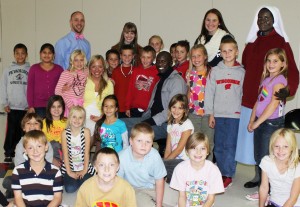
During the last few months of school, the Pewaukee students and teachers prepared pictures, videos and letters to share with their new friends in Uganda; one of my main tasks this time around will be to bring the hundreds of letters and pictures and hugs from Pewaukee to our sponsored kids in Uganda (talk about being the bearer of good news)! Here is a video that one of my students at Pewaukee made to show the sister school students how much we care about them.
While our sponsorship project is a wonderful beginning, I plan to meet with our (newly formed :)) education committee in Padibe to discuss various ways that we may be able to further our efforts in a way that will touch more students, more villages, more families. Some ideas so far have been teacher partnerships and integrating problem-solving around issues in Padibe into the classrooms of Pewaukee. BUT, as always… we shall see! As I learned last time, God’s curriculum plan for me is often quite a bit different from my own. The one thing I know is that, for the first time in my 30 years of life, I feel as if I’ve finally stopped struggling against the movement of divine energy and jumped right into its flowing force: while this work is challenging, I really feel like nothing could be easier. As I let go of my fears and release my grip from the shore, a powerful current has taken over for me. And instead of trying so darned hard to make things happen, they just do. Things just keep working. And it just keeps making sense in a nonsensical, crazy, confusing, yet perfectly-ordered sort of way. As I pack my recently purchased journal, travel yoga mat, and maxi-dresses (THIS girl is not making the “short dress mistake” again THIS TIME, guys… if you don’t get it, check my old posts from July 2011 :)), I know that I will come back with a whole new unbelievable story that even a best-selling author couldn’t concoct. So, here I go. In I dive. Let the journey begin!
|
Internal
Partnership
|







